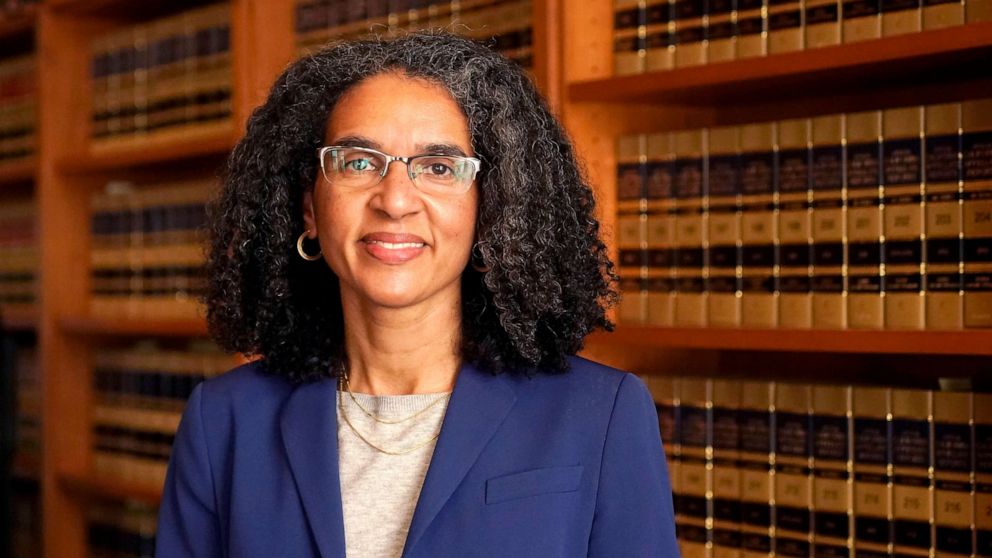A backer calls her a “consensus builder” whose “first love” is the high court.
At the California Supreme Court, justices keep bound copies of the U.S. Supreme Court’s official opinions on their chamber shelves.
But Leondra Kruger, says someone who knows well, keeps hers within arm’s reach.
“I think that that’s because the U.S. Supreme Court really is her first love,” said Greg Wolff, Kruger’s former head of chambers.
Before long, Kruger could be getting one step closer to what Wolff calls her dream job.
Kruger is one of the candidates on President Joe Biden’s short list to replace retiring Justice Stephen Breyer. Other candidates include U.S. Appeals Court Judge Ketanji Brown Jackson and U.S. District Judge J. Michelle Childs of South Carolina.
Biden promised to name his pick by the end of February.
Personal Life
If he chooses her, Kruger, at age 45, would be the youngest justice on the U.S. Supreme Court bench. She was just 38 when nominated to the California Supreme Court with no judicial experience.
The Los Angeles area native went to high school in Pasadena. She went to Harvard College for her undergraduate degree and received her juris doctor degree from Yale Law School. She was the first black woman to be editor-in-chief of the Yale Law Journal.
Kruger has two children with her husband. According to the Associated Press, Kruger is the first woman to have a baby while serving on the California Supreme Court.
Wolff told ABC News family Kruger is quiet but loves to talk about her kids.
Professional life
The U.S. Supreme Court is not new to Kruger. After graduating from Yale Law School, she clerked for Supreme Court Justice John Paul Stevens after clerking for Judge David S. Tatel of the United States Court of Appeals for the D.C. Circuit.
Kruger also served as an assistant to the solicitor general and as acting deputy solicitor general in the Obama administration. During that time, she argued 12 cases before the nation’s high court.
One of these was Hosanna-Tabor Evangelical Lutheran Church and School v. Equal Employment Opportunity Commission, et al. in which Kruger argued against a “ministerial exception” for religious groups from anti-discrimination laws governing employment practices. While the court unanimously ruled against the Obama administration, Kruger has faced criticism from some religious organizations for advancing its views.
Judicial philosophy
Wolffe describes Kruger’s judicial philosophy in one word as “careful.”
“She’s careful; she has no agenda, absolutely no political agenda,” Wolffe said. “She is trying to figure out the most fair and just decision for that particular case.”
Manhattan Institute President Reihan Salam told ABC’s George Stephanopoulos during a “This Week” roundtable last month that Kruger builds bridges on the court.
“Someone like a Leondra Kruger is known as a pretty heterodox person, someone who has oftentimes voted with conservatives on the California Supreme Court,” Salam said. “Her experience is meaningfully different from other potential nominees who have a more ideological reputation.”
Greg Wolff echoed that sentiment.
“She’s a consensus builder,” Wolff told ABC News’ Devin Dwyer. “[The] California Supreme Court is very diverse, has a lot of different views, but they’re often unanimous in their decisions, and I think she’s a big reason for that. Her colleagues listened to her; they trust her. And, I think a lot of times she’s helpful in finding a position that a majority of the court can support.”
Kruger explained in a 2018 interview with the Los Angeles Times how she addresses cases.
“My approach reflects the fact that we operate in a system of precedent,” Kruger said. “I aim to perform my job in a way that enhances the predictability and stability of the law and public confidence and trust in the work of the courts.”
ABC News’ Devin Dwyer contributed to this report.

